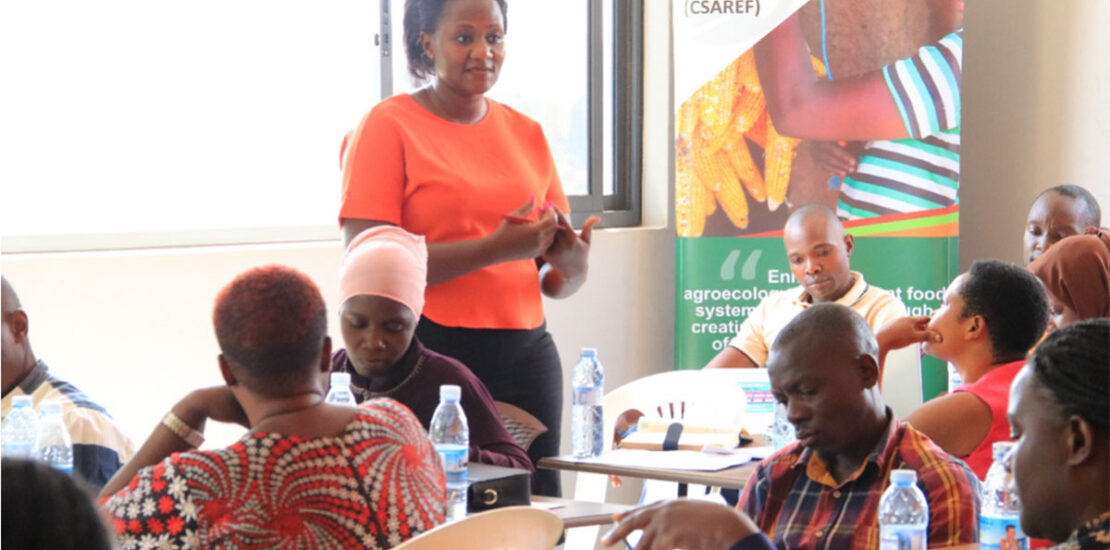Agroecology Production Sustainability Plan and Marketing Strategy: Empowering Smallholder Women and Youth Farmers in Uganda
- July 10, 2024
- Posted by: CEFROHT Reporter
- Category: News Updates

In our continued commitment to building resilient and equitable food systems, the Centre for Food and Adequate Living Rights (CEFROHT) developed a comprehensive Agroecology Production Sustainability Plan and Marketing Strategy in May 2024. This initiative aims to support smallholder farmers, particularly women and youth, in rural and peri-urban areas of Uganda.
This initiative emerged from a series of inclusive and participatory consultative meetings involving women and youth farmer groups, agroecology value chain actors, civil society organisations (CSOs), and local government authorities. The consultative process enabled stakeholders to identify key supply-side challenges affecting agroecological production and market access, including limited irrigation, poor market infrastructure, seasonal variability, post-harvest losses, and weak bargaining power in local markets.
As a result, the Agroecology Production Sustainability Plan and the Agroecology Marketing Strategy are deeply grounded in the realities of Uganda’s smallholder agroecology farmers. They address systemic barriers faced particularly by women and youth, who form the majority of the agroecological workforce yet remain marginalised in decision-making, financial inclusion, and market participation.
To ensure the relevance and ownership of the strategies, on 4 July 2024, CEFROHT convened a participatory validation meeting with critical stakeholders, including women and youth farmer cooperatives, local government officials (sub-county and district levels), CSOs working in food systems, climate justice, and economic empowerment, as well as market actors and extension officers.
This validation meeting served as a platform to refine, finalise, and strengthen the strategies by incorporating practical insights and community-driven solutions. Participants reviewed proposed interventions and shared additional ideas, ensuring the tools were not only policy-aligned but also implementable at the grassroots level.
A key outcome was the active commitment from local government authorities to support the strategies’ implementation. The Town Clerk of Kasangati Town Council pledged to:
- Facilitate affordable credit for women and youth agroecology farmers through the Parish Development Model (PDM), linking farmer groups to local SACCOs for low-interest microfinance;
- Extend irrigation infrastructure to smallholder farms under the government’s Microscale Irrigation Programme, combating erratic weather patterns and ensuring year-round production;
- Support market linkages by integrating farmers into local economic planning and connecting them to emerging “Earth Markets” that prioritise local, organic, and sustainably produced food.
These commitments highlight growing recognition among duty-bearers of agroecology’s importance for climate adaptation, food security, and youth and women’s economic empowerment.
Following the strategies’ finalisation, CEFROHT launched capacity-building trainings for smallholder agroecology farmer groups, equipping them with skills to implement the sustainability plan and leverage the marketing strategy. Key training areas included:
- Climate-resilient agroecology practices to boost productivity and preserve soil fertility;
- Post-harvest handling and storage techniques to reduce losses;
- Value addition and packaging to enhance product competitiveness;
- Market intelligence and collective marketing strategies to strengthen bargaining power;
- Financial literacy and SACCO engagement to improve access to credit.
These trainings have already yielded tangible results, with farmers reporting higher productivity, better post-harvest outcomes, and improved market linkages through Earth Markets, cooperatives, and community-supported agriculture platforms.
Through this initiative, CEFROHT is not only tackling immediate challenges but also laying the groundwork for transforming Uganda’s agri-food systems. By prioritising grassroots participation, local government collaboration, and a rights-based framework, CEFROHT is fostering resilient, empowered, and economically viable agroecology communities. These efforts offer a replicable model for sustainable food sovereignty and ecological justice across East Africa.
